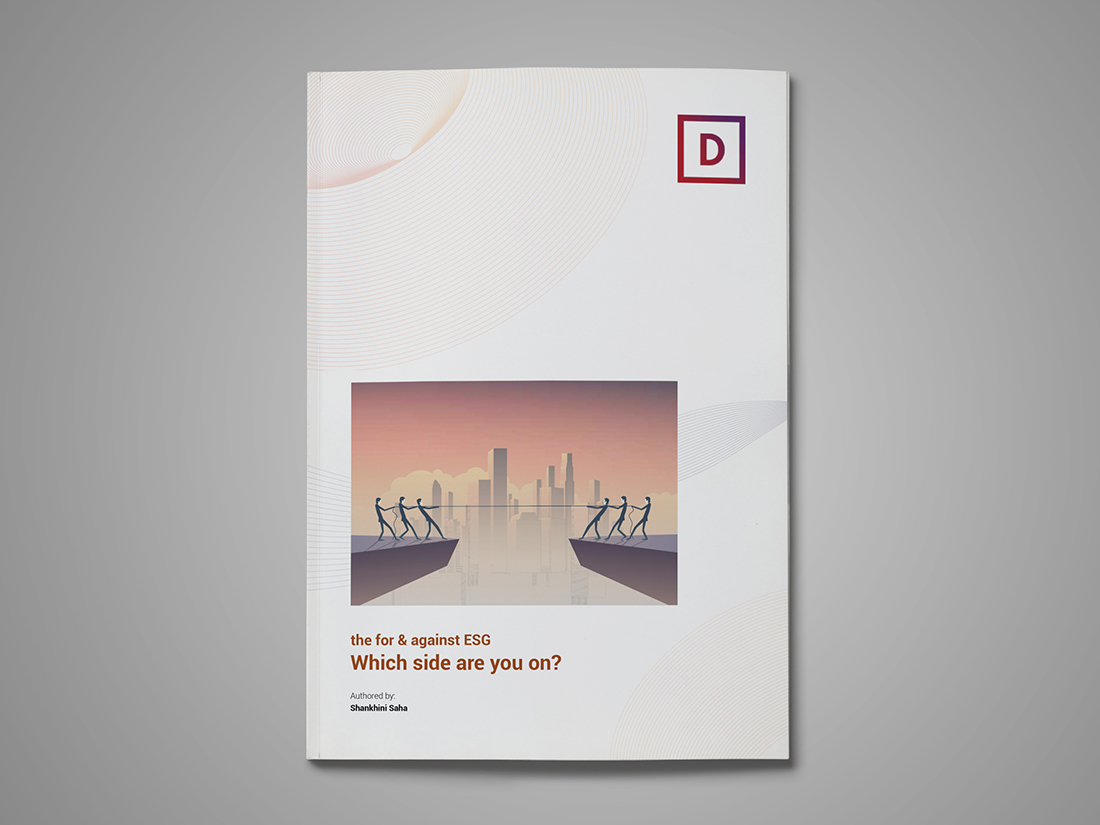the for & against ESG – Which side are you on?
The debate concerning ESG (environmental, social and corporate governance) performance has brought into focus global attention towards sustainable investing. Executives are examining key issues in sustainable business ranging from how to measure & monetise ESG performance to devising long-term sustainable investment strategies. Is building ESG into a portfolio strategy guaranteed to achieve both financial and non-financial returns for investors? Such questions form the crux of an ongoing discussion for and against the current focus on ESG performance.
Maximising profit and efficiency has been the sole substance of the corporate governance moral compass; no more has been expected by the investor community, before now
What do doubters of ESG think?
As we look at the arguments against ESG, several are naming an “ESG industrial complex.” [1]An industrial complex is a socioeconomic concept where businesses become entwined in social or political institutions to create (or bolster) a profit economy. In this vein, ESG is being described as a socially subscribed fad forming an “ESG gravy train, with stockholders and taxpayers paying.” [2]Dissenters are also posing questions of why capital markets must be answerable to global concern on climate change action and social welfare— why should financial markets interfere with public interest at all? For instance, ESG dissident, Robert Armstrong, confesses, “I just can’t see how financial markets have a meaningful part to play in solving these problems until citizens and governments act first and decisively.”[3]
In addition to these arguments, there are also those that classify a “rising sway of ESG funds” as being spearheaded by impressionable ‘millennials’ and ‘Generation Z’ investors lured by fashionable eruptions in social/climate justice. Furthermore, prominent intellectuals such as Dr. Aswath Damodaran (Stern Business School, NYU) have acquired celebrity status as ESG skeptics in the debate for and against ESG. Damodaran raises questions like “Are ESG ratings more a measurement of how much a company’s economic value is at risk due to ESG factors, and less about actual corporate responsibility?”[5] Damodaran also probes investors to locate the “tangible outcomes”[6] of high ESG ratings & corporate promises. Such narratives against ESG are the remnants of an isolationist capitalist mentality where financial markets have enjoyed an isolation from our global society’s evolving social/climate conscious. The isolationist capitalist mentality has not needed to interfere, or show involvement in caring for public interest; profitability and maximised efficiency have been the global markets’ core guiding principles. How long can this last?
What do proponents of ESG think?
On the other side of the fence, there are consultants, advocates, and executives in favour of ESG. They are experiencing a paradigm shift in the history of investing. A paradigm shift where investors are emphasising environmental, moral, and ethical expectations from companies and their valuations (in addition to investor likeness for profit and high returns). A company’s ESG performance demonstrates a corporate conscience in line with public interest, that disrupts the tradition of isolationism in capitalist mentality mentioned earlier. The isolationist capitalist mentality has systematically exempted accountability for ethical-environmental consequences caused by corporate action (except for in crises management cases & major disasters i.e. BP’s Deepwater Horizon oil spill in 2010). Maximising profit and efficiency has been the sole substance of the corporate governance moral compass; no more has been expected by the investor community, before now. The contemporary rise in ESG interest is testament to how investors are no longer accepting informed ignorance from financial markets. Global interest in ESG performance marks a seismic change in the functions of capitalism where companies interested in building long-term, value-based relationships with stakeholders are mobilising towards preventative social/climate measures.
What’s happening on the ground?
In our zeitgeist, ESG-oriented investing has experienced a meteoric rise. If “the bar for what is a good corporate citizen is abysmally low,” [7] ESG is raising a new standard. For instance, it heralds major changes in corporate governance structures by inciting the formation of specialised committees to meet ESG goals. Executive performance is also becoming ESG-linked. In addition, McKinsey’s reputed quarterly report on ESG value creation reports global sustainable investment now at $30 trillion- up 68 percent since 2014 and tenfold since 2004. [8] McKinsey’s analysis also shows an emerging realisation amongst executives that a “strong ESG proposition can safeguard a company’s long-term success,” making ESG “more than a fad or a feel-good exercise.” The five important ways in which ESG links to cash flow is listed as: (1) facilitating top-line growth, (2) reducing costs, (3) minimising regulatory and legal interventions, (4) increasing employee productivity, and (5) optimising investment and capital expenditures. Companies that incorporate these factors into “softer” approaches in re-evaluating company purpose & values are more robust in achieving the heavier ESG lifting. Such companies are distinct from those with weak ESG proposition; in the past few years, multiple companies with weak ESG proposition saw double-digit declines in market capitalisation.
What Dickenson’s experience shows
We have observed that embodying a sincere commitment to ESG goes beyond “the letter of laws,” [9] it is in the spirit and purpose of governance that can never be hermetically separate from changes in company policy. Moreover, transparency and dialogue with regulators alongside preventative social/climate action can reduce “informational asymmetry” with the general public in ESG reporting. This results in greater confidence by investors. Academic researchers Cheng et al. (2014: 16) have stated, “Higher levels of transparency reduce informational asymmetries between the firm and investors, thus mitigating perceived risk.” [10] Bassen et al. (2006)’s research has also found positive associations between best ESG practices and the risk profile of a company. [11] A landmark report on ESG by academician Sarafeim (2014) reached similar conclusions in his study. By preparing an Integrated Report (i.e., a report that combines financial and sustainability data), companies attract investors that value long-term investments.[12] The Beta risk indicator, calculated using the Capital Asset Pricing Model (CAPM) procedure, had a negative correlation with the ESG indicators, showing that the disclosure of ESG practices results in less risk and, consequently, a lower cost of capital.[13]
Food for thought
After looking at the for and against ESG, it is evident that executives demanding ESG advice are now answerable to segments of the investor community (in value and growth investing) that are no longer enamoured only by high numbers, and strong balance sheets. Investors that value ESG want to hear more about corporate promises on improving environmental sustainability and social welfare. These investors are receptive to wide-spread repercussions of climate and social injustice, and are interested to read longer disclosures in Integrated/Annual Reports resulting from more ESG involvement. They are energised to follow the tangible improvements following corporate promises. Investor behaviour towards more ESG emphasis declares, ‘why can’t we have both—high returns and high social responsibility?’ BlackRock’s Larry Fink observed in his highly influential 2019 letter to CEOs that “as divisions continue to deepen, companies must demonstrate their commitment to the countries, regions, and communities where they operate.” It is inevitable that the “the core principles of corporate finance investing” are changing— so which side are you on?
1 Armstrong, Robert. “The ESG Investing Industry Is Dangerous.” Financial Times, 24 Aug. 2021, https://www.ft.com/content/ec02fd5d-e8bd-45bd-b015-a5799ae820cf.
2 “Damodaran Says ESG Investing Is a Mistake, Will Not Make You Money.” The Economic Times, https://economictimes.indiatimes.com/markets/stocks/news/aswath-damodaransays-esg-investing-will-not-make-you-money-its-a-mistake/articleshow/86222275.cms.
3 Ibid 1
4 Ibid 2
5 Ibid 2
6 Ibid 2
7 “Experience Stern: Faculty & Research ‘The World May Be Better without ESG Investing’.” NYU Stern, https://www.stern.nyu.edu/experience-stern/faculty-research/world-may-be-better-without-esg-investing.
8 Five Ways That ESG Creates Value – McKinsey & Company. https://www.mckinsey.com/~/media/McKinsey/Business%20Functions/
Strategy%20and%20Corporate%20Finance/Our%20Insights/Five%20ways%20that%20ESG%20creates%20value/Five-ways-that-ESGcreates-value.ashx.
9 Ibid 8
10 Journal of Cleaner Production – FGV EAESP Pesquisa. https://pesquisa-eaesp.fgv.br/sites/gvpesquisa.fgv.br/files/arquivos/1._orsato_sensitive_i_-_1-s2.0-s0959652617304067-main.pdf.
11 The Influence of Corporate Responsibility on the Cost of Capital. Working Paper series. University of Hamburg. Bassen, A., Meyer, K., Schlange, J., 2006.
12 Integrated Reporting and Investor Clientele. Harvard Business School. Serafeim, G., 2014.
13 Ibid 12
References
“The ESG Investing Industry Is Dangerous.” Armstrong, Robert. Financial Times, 24 Aug. 2021, https://www.ft.com/content/ec02fd5d-e8bd-45bd-b015-a5799ae820cf.
“Damodaran Says ESG Investing Is a Mistake, Will Not Make You Money.” The Economic Times, https://economictimes.indiatimes.com/markets/stocks/news/aswath-damodaran-says-esg-investing-will-not-makeyou-money-its-a-mistake/articleshow/86222275.cms.
“Experience Stern: Faculty & Research ‘The World May Be Better without ESG Investing’.” NYU Stern, https://www.stern.nyu.edu/experience-stern/faculty-research/world-may-be-better-without-esg-investing.
“Five Ways That ESG Creates Value.” McKinsey & Company. https://www.mckinsey.com/~/media/McKinsey/Business%20Functions/
Strategy%20and%20Corporate%20Finance/Our%20Insights/Five%20ways%20that%20ESG%20creates%20value/Five-ways-that-ESG-creates-value.ashx.
Journal of Cleaner Production – FGV EAESP Pesquisa. https://pesquisa-eaesp.fgv.br/sites/gvpesquisa.fgv.br/files/arquivos/1._orsato_sensitive_i_-_1-s2.0-s0959652617304067-main.pdf.
“The Influence of Corporate Responsibility on the Cost of Capital.” Working Paper series. University of Hamburg. Bassen, A., Meyer, K., Schlange, J., 2006.
“Integrated Reporting and Investor Clientele.” Harvard Business School. Serafeim, G., 2014.

the for & against ESG Which side are you on?
To download and save this article.
Shankhini heads our Knowledge Team and is spearheading new ventures in the US, UK, and MENA regions. She is an MPhil Graduate (Distinction) in Criminology from University of Cambridge, and a BA graduate magna cum laude from The New School (NYC) in Global Studies and French. To know more about our capabilities, contact enquiry@dickensonworld.com.
Authored by:
Shankhini Saha,
Associate Director – Investor Relations
Email : shankhini.saha@dickensonworld.uk


Leave A Comment